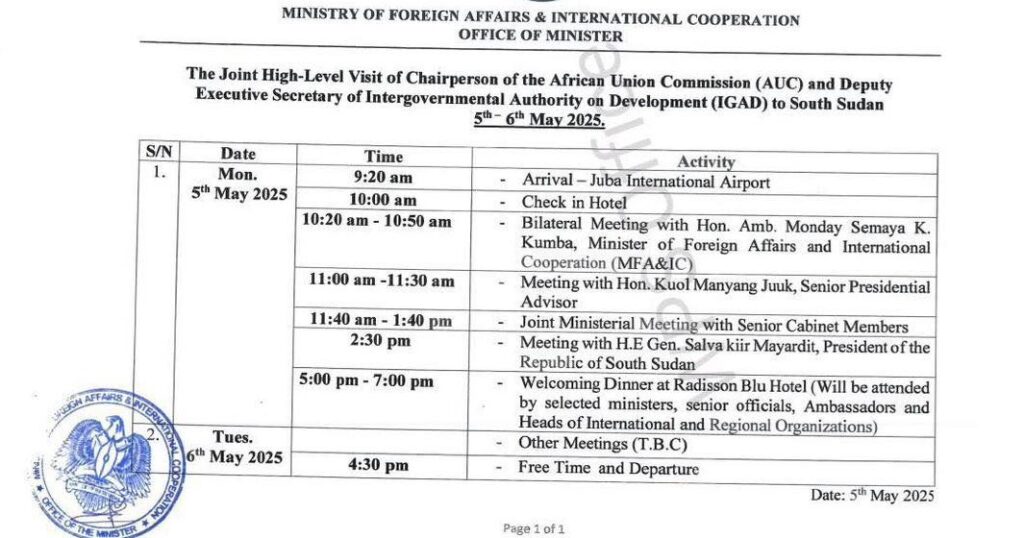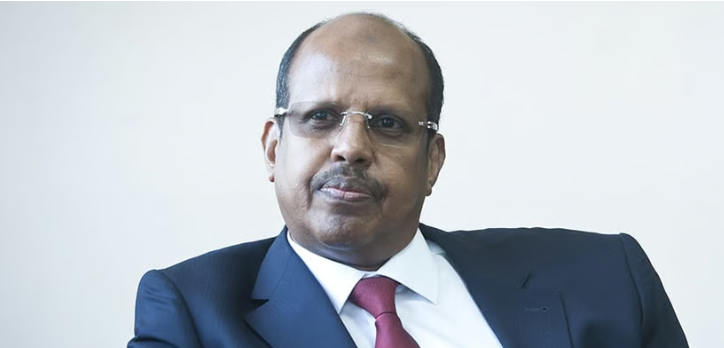The chairperson of the African Union Commission, Mahmoud Ali Youssouf, has “unreservedly condemned” the bombing of a Médecins Sans Frontières (MSF) health facility in Old Fangak, a town in South Sudan’s Jonglei State, by the country’s army on Saturday morning.
The condemnation came a day before Mr. Youssouf’s scheduled two-day visit to Juba, South Sudan’s capital, beginning Monday. The trip takes place amid heightened political and security tensions following the detention of First Vice President Riek Machar on March 26.
On April 24, Mr. Youssouf held talks with Ugandan President Yoweri Museveni in Kampala, where they addressed regional peace and security.
Uganda, a key ally of President Salva Kiir, deployed troops to South Sudan in early March to bolster the government amid fears of renewed conflict.
Mr. Youssouf will lead a delegation that includes Mohamed Abdi, the deputy executive secretary of the Intergovernmental Authority on Development (IGAD). Their agenda includes meetings with South Sudan’s foreign minister, Monday Semaya; presidential adviser Gen. Kuol Manyang; and senior cabinet members before an expected discussion with President Salva Kiir.
A Foreign Ministry document dated May 3 outlined the schedule, noting that the officials would depart on Tuesday after additional meetings.

The Foreign Ministry said on Sunday it had extended “a cordial invitation” to Mahmoud Ali Youssouf, the chairperson of the African Union Commission, and Mohamed Abdi Ware, the deputy executive secretary of the Intergovernmental Authority on Development, to visit South Sudan.
The ministry further said the joint visit was intended to “facilitate meaningful diplomatic and political dialogue.”
In a statement issued on Sunday and seen by Radio Tamazuj, Mr. Youssouf denounced the attack on Old Fangak as “a flagrant breach” of international humanitarian law, citing the loss of lives and property, as well as the denial of civilians’ right to health care and protection.
He urged the South Sudanese government to investigate the incident and hold those responsible accountable, calling it a “heinous crime.”
The AU official also expressed hope for peace, stability, unity, and national reconciliation in South Sudan, urging parties to the 2018 peace agreement to recommit to its implementation.
It remains unclear whether the African Union Commission delegation will be permitted to meet with Mr. Machar, who remains in detention. Previous requests by high-level officials, including representatives from Kenya, the AU Panel of the Wise, and the European Union, have been denied.
President Kiir faces growing pressure from the United States and other Western nations to release Mr. Machar, implement the peace deal, and prepare for long-delayed elections, now scheduled for December 2026.
In the latest violence, at least seven people were reported killed after the MSF-run hospital and a nearby market were bombed in Old Fangak, raising fears of a return to civil war.
The hospital, the only one in Fangak County—home to more than 110,000 people—was destroyed along with all its medical supplies, according to MSF.
South Sudan’s government has not yet commented on the attack.
Hours before the bombing, South Sudan’s army chief, Gen. Paul Majok Nang, vowed retaliatory strikes after several river barges were allegedly hijacked. He blamed the attacks on forces linked to Mr. Machar, who have denied involvement.
Mr. Machar was arrested in March along with several associates and accused of plotting a rebellion. The government has recently designated nine counties as “hostile”—a term implying allegiance to Mr. Machar—fueling suspicions that the country could be sliding back into conflict.
A 2018 peace agreement led to the formation of a unity government with Mr. Kiir and Mr. Machar at the helm, but elections have been repeatedly delayed. The deal also called for the disbandment of militias and the creation of a unified national army, but armed groups remain loyal to rival political factions.




